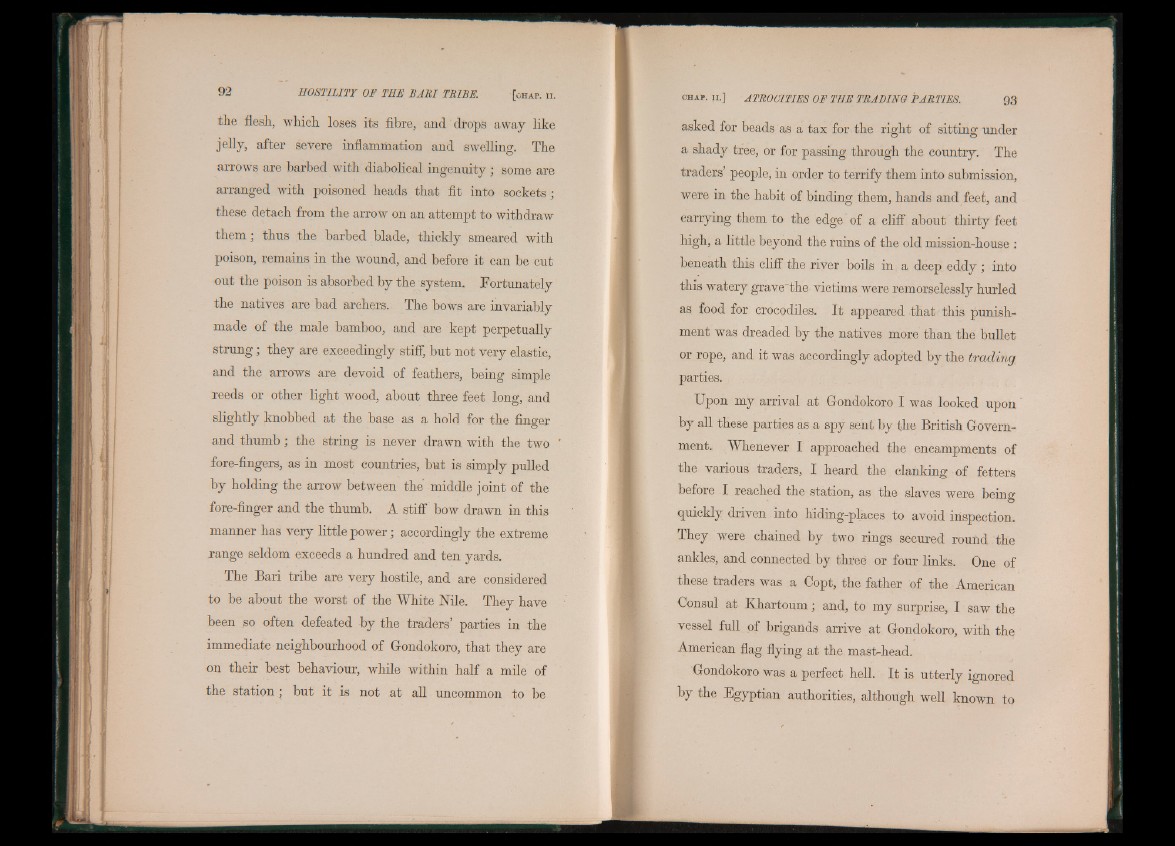
the flesh, which loses its fibre, and drops away like
jelly, after severe inflammation and swelling. The
arrows are barbed with diabolical ingenuity; some are
arranged with poisoned heads that fit into sockets;
these detach from the arrow on an attempt to withdraw
them; thus the barbed blade, thickly smeared with
poison, remains in the wound, and before it can be cut
out the poison is absorbed by the system. Fortunately
the natives are bad archers. The bows are invariably
made of the male bamboo, and are kept perpetually
strung; they are exceedingly stiff, but not very elastic,
and the arrows are devoid of feathers, being simple
reeds or other light wood, about three feet long, and
slightly knobbed at the base as a hold for the finger
and thumb; the string is never drawn with the two
fore-fingers, as in most countries, but is simply pulled
by holding the arrow between the middle joint of the
fore-finger and the thumb. A stiff bow drawn in this
manner has very little power; accordingly the extreme
range seldom exceeds a hundred and ten yards.
The Bari tribe are very hostile, and are considered
to be about the worst of the White Nile. They have
been so often defeated by the traders’ parties in the
immediate neighbourhood of Gondokoro, that they are
on their best behaviour, while within half a mile of
the station; but it is not at all uncommon to be
asked for beads as a tax for the right of sitting under
a shady tree, or for passing through the country. The
traders’ people, in order to terrify them into submission,
were in the habit of binding them, hands and feet, and
carrying them to the edge of a cliff about thirty feet
high, a little beyond the ruins of the old mission-house :
beneath this cliff the river boils in a deep eddy; into
this watery grave'the victims were remorselessly hurled
as food for crocodiles. I t appeared that this punishment
was dreaded by the natives more than the bullet
or rope, and it was accordingly adopted by the trading;
parties.
Upon my arrival at Gondokoro I was looked upon
by all these parties as a spy sent by the British Government.
Whenever I approached the encampments of
the various traders, I heard the clanking of fetters
before I reached the station, as the slaves were being
quickly driven into hiding-places to avoid inspection.
They were chained by two rings secured round the
ankles, and connected by three or four links. One of
these traders was a Copt, the father of the American
Consul at Khartoum; and, to my Surprise, I saw the
vessel full of brigands arrive at Gondokoro, with the
American flag flying at the masfihead.
Gondokoro was a perfect hell. I t is utterly ignored
by the Fgyptian authorities, although well known to